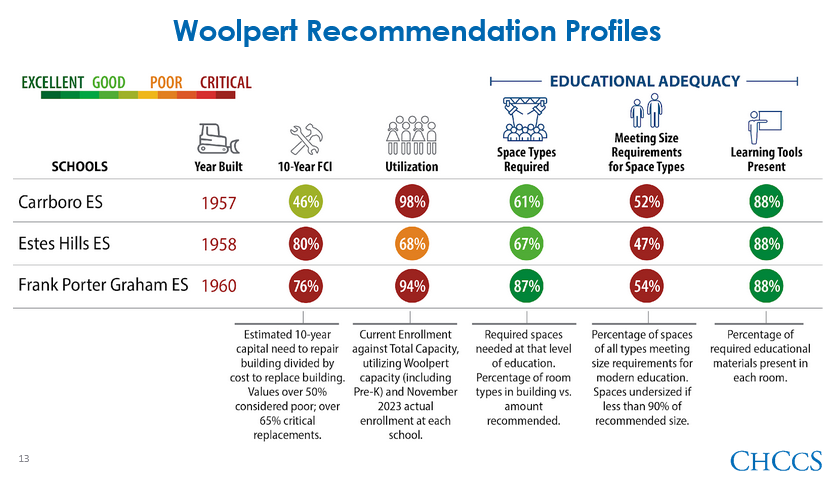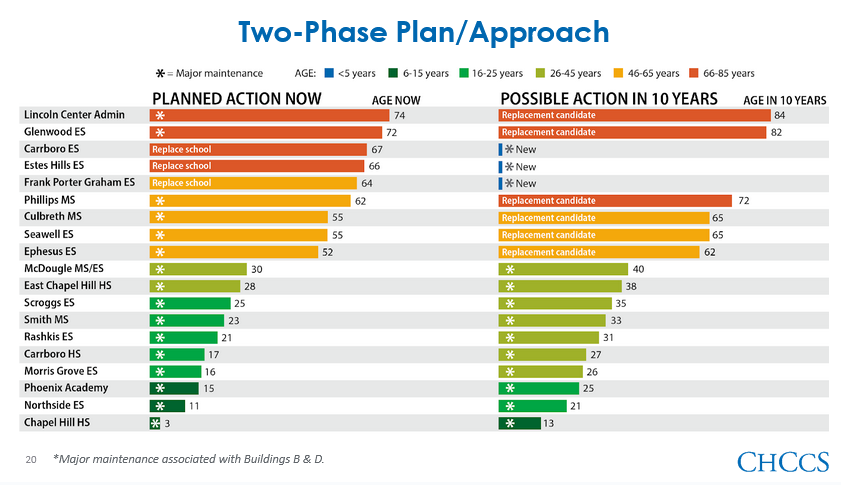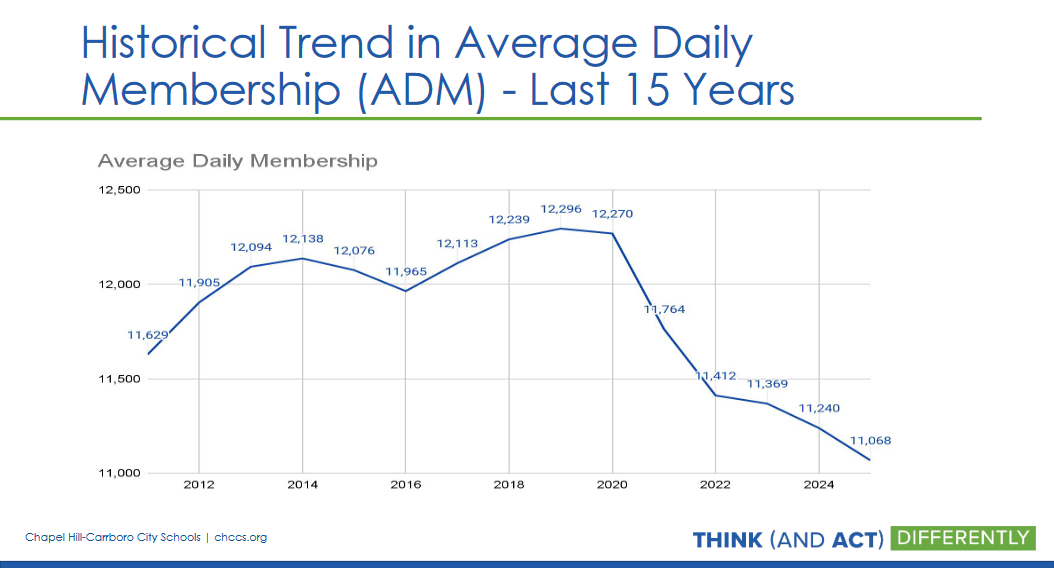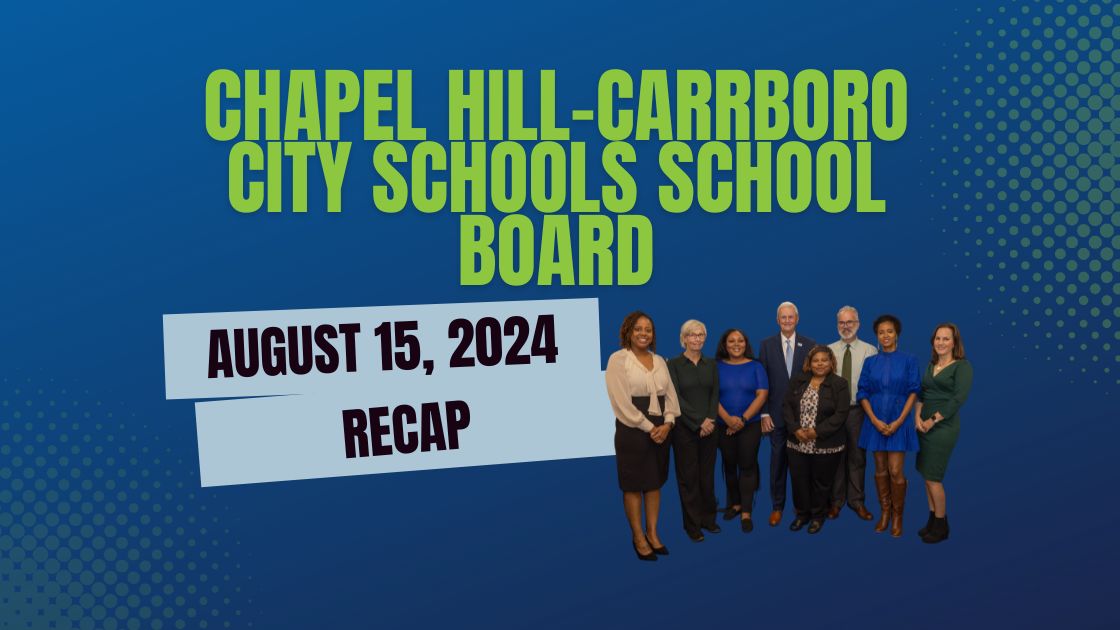Apologies for the delay in getting this school board recap out. The August 15th meeting was shorter than the board’s recent meetings – open session clocked in around 3 hours and 15 minutes, but that’s still pretty long for a recap. (For comparison, the movie Titanic also clocks in at 3 hours and 15 minutes.)
A number of important decisions took place, which I’ll detail in a moment.
But I want to say this first. The entire meeting – and recent ones before it – have made this very clear: The Republican-dominated North Carolina General Assembly’s assault on public education shows no signs of letting up, and it’s getting increasingly tough to run a high-achieving, equitable district in this environment.
With that under our belts, let’s get started:
The meeting opened with a reading of a letter from the School Board to Sen. Phil Berger (R) and Rep. Tim Moore (R) in the General Assembly, requesting a pay raise for all staff.
Board members asked state legislators for a 5% raise for all staff, noting that “The necessary funds are already allocated within the state budget.”
Puny state increases in salary have not kept pace with inflation. School staff pay in North Carolina is abysmal. According to the National Education Association, our average teacher starting salary is $40,136, which makes us 42nd in the nation. The average teacher salary is $56,559, making us 38th in the nation.
The Economic Policy Institute estimates that a minimum living wage, which is the income needed for a family of one adult and one child to live in the most affordable metropolitan area, is $55,545. (Unsurprisingly, teachers earn 26% more in states with collective bargaining, North Carolina’s anti-union laws and history explain a lot about our shredded safety net and high degree of economic inequality.)
That’s why so many of our staff need second jobs during the school year or have to take on an extra gig during the summer. That’s also why so many of our staff can’t afford to live in increasingly expensive Chapel Hill or Carrboro, instead enduring long commutes back and forth each day.
The November elections are absolutely critical. Without electing a Democratic governor and state superintendent of public instruction, and without breaking the supermajority, teacher pay will continue to stagnate and per-pupil spending will too. (Related: Read our interview with Mo Green, the Democratic candidate for State Superintendent of Public Instruction and our interview with Josh Stein, the Democratic candidate for Governor.)
The Board voted to approve an amendment to the 2024 Orange County-CHCCS Bond Project Plan
After months of planning with the Capital Needs Work Group of the Board of Orange County Commissioners, extensive public feedback, three Board meetings, and four community sessions,the Board has settled on a plan. (Here’s the latest presentation.)
If the Bond passes, we will have funds to construct three new schools. Based on factors like age and condition of the buildings, the Board agreed that Carrboro Elementary School, Estes Hills Elementary, and Frank Porter Graham Bilingue will be replaced, and that Phllips and Culbreth Middle Schools will receive extensive renovations. (This is the same plan we wrote about in July.)

The new versions of Carrboro and Estes Hills will be on the same sites as the current schools. FPG will need a new site, as it’s currently on a piece of property that is in a flood plain. At this time, the new location of FPG is TBD.
Kudos to the district for being willing to go back to the drawing board several times and, especially, for incorporating elements of the Carrboro Connects comprehensive plan and the Chapel Hill Complete Communities project. The new plan prioritizes walkability and bikeability, preserving racial and socioeconomic diversity, and putting the largest possible number of students in the newest, safest buildings.
While the Orange County commissioners must sign off on this new plan, that seems likely. It’s really important that this bond get passed in November! The district spends a ton of money maintaining old and inefficient buildings. Getting new infrastructure will improve energy efficiency and help the schools use scarce funds for instruction rather than, say, hunting down a hard-to-find part for a super old HVAC system. (That happens! That’s crazy!)

For the first time ever, the district is implementing a comprehensive set of rules for cell phones.
Since the beginning of the summer, principals from the middle and high schools have been working to formulate across-the-board rules for cell phones. District staff presented research on best practices as well as data from school staff. Without regulations, there’s been widespread distraction from learning and enormous headaches for teachers. The board heard how a huge proportion of disciplinary incidents stem from social media-sparked fights between students, as well as kids using their phones to film things they shouldn’t (confidential conversations between teachers and parents, among the most troubling).
For the 2024-2025 school year, every middle school will have an “away for the day” policy, meaning that students may bring their phones to school but must leave them in their lockers. High school students will all be expected to have their phones turned off and put away during class. District staff talked about wanting to build a sort of phone-free pipeline, by which current middle schoolers will enter high school with different expectations about cell phone use as compared with current high schoolers. The discussion touched on the benefits of bottom-up rules vs a top-down policy, with staff emphasizing that a directive from the school board would have gotten less buy-in than the approach on which they decided: to solicit input from teachers and administrators first. The Board may yet revisit the need for a policy, but all seemed to agree that this will work much better if there is investment from everyone.
We got an update on the financial status of the schools
A few weeks ago I wrote about the scary email all parents in the district received about the financial crisis the school district is in.
For the last two years, the district and Board have been discussing how a confluence of factors – drying up of federal COVID funds, runaway inflation, and directives from the County Commissioners to spend down the local fund balance – meant that something was going to have to give.

Unfortunately, it now has, and the superintendent rolled out a reduction-in-force (“RIF”) plan. A few months ago, the district announced part one of its plan to address the bleak financial picture, namely, not filling a series of locally-funded positions once they became vacant.
But more still needs to be done. This was the presentation given – it’s worth a read in full. So, effective once the Board has its specially called meeting on 8/21 at 6:00pm, there will be a reduction in force of 24 positions from the central office. Fortunately, this doesn’t mean 24 layoffs. 13 of these positions are vacant. Most others will be offered a position outside of the central office.
Still, this is a tough pill to swallow; the folks in the central office are absolutely critical to the district’s ability to meet the goals outlined in its strategic plan, many of which focus on closing gaps in opportunity and achievement. A third part of the RIF plan is a gradual reduction in non-core teaching roles, through which vacant positions are not filled, and the allotment formula changes such that each school is optimally staffed. Some staff will need to be reassigned next year. It’s clear to us the district worked hard to take care of the folks being negatively affected while also prioritizing fiscal responsibility. We all want to avoid the situation like the one in, for example, the San Francisco Unified School District, where the deficit grew so large that outside state monitors were given veto power over the district’s spending.
What are the takeaways?
Support your child’s teacher!
Because GOP anti-public school legislators are cheap and mean, teachers don’t have what they need. Help out by volunteering in the classroom, supplying items teachers request, and getting your child to school on time every day if at all possible. It’s tough to teach! It’s tougher still if kids regularly arrive late.
Do everything you can to elect public education-supporting politicians in November.
We aren’t sure why Michele Morrow, a home-schooler who brought her kids to the Capitol on January 6th, is qualified to run for any office, but especially superintendent of education. We also aren’t sure why Mark Robinson hasn’t been disqualified, since he thinks “some people need killing.” But hey, these are crazy times.
Our local school district is definitely not an island. We need a supportive state legislature. Get involved.
Lit drop with FlipNC
FLIP NC is an all-volunteer, grassroots organization formed over beers by friends frustrated by a North Carolina political landscape that is not representative of the people. They are flipping our state courts blue. They need help with lit drops. You can leave lit (their flyer about the extreme right-wing takeover of our NC courts and the awesome Democratic candidates running for statewide judicial races this year) at left-leaning voters’ doors anywhere in North Carolina. This is perfect for introverts: it doesn’t involve talking to people. Learn more here.
Phone bank or canvass with Orange County’s County to County initiative
County to County is an all-volunteer organization dedicated to helping Democrats take back the state legislature in North Carolina. They partner with more than a dozen counties to provide volunteers and technical support. This is perfect for extroverts. They have canvassing and phone banking opportunities.
Volunteer with Neighbors on Call
Their focus is canvassing in swing districts in the Triangle area. They have incredibly organized events and lots of informative (virtual) meetings, with special guests like legislators! Learn more here: https://www.neighborsoncall.org/
Sign up to be a volunteer with the Orange County Democratic Party
They have a variety of tasks, from getting involved with statewide judicial campaigns to becoming a poll observer (after training!) to data entry to texting to fundraising to organizing. They are also canvassing, postcarding, and phone banking right now. They have opportunities for introverts and extroverts. Sign up here.

